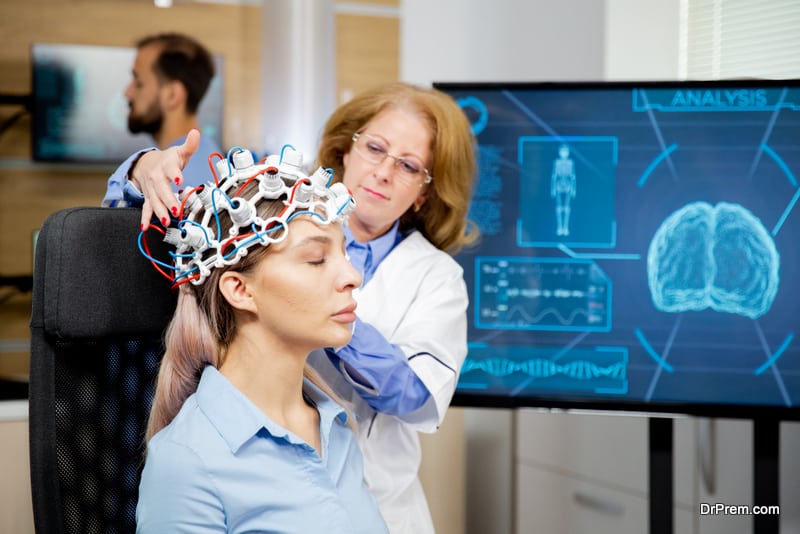Transcranial Magnetic Stimulation (TMS) is an advanced therapy option for various mental health disorders. TMS treatment APN (Advanced Practice Nurse) involves a professional healthcare provider specializing in delivering this non-invasive treatment.
In this article, we will explore the specifics of TMS treatment APN, including its effectiveness, procedure, conditions treated, and the role of the APN in administering the treatment.
What is TMS Treatment APN?
TMS treatment APN is a process where an Advanced Practice Nurse administers TMS therapy to patients. TMS therapy uses magnetic pulses to stimulate nerve cells in the brain associated with mood control and depression.
TMS treatment APN plays a critical role in ensuring the correct application of this treatment, monitoring patient progress, and making necessary adjustments during therapy sessions.
How Does TMS Treatment Work?
TMS treatment involves placing a magnetic coil against the patient’s scalp. The coil sends magnetic pulses into specific areas of the brain responsible for mood regulation. TMS treatment APN ensures the process is precisely executed, and the patient receives the right amount of stimulation during each session.

Each session of TMS treatment APN lasts about 20 minutes, with no recovery time required, allowing patients to resume their daily activities immediately after treatment. This makes it a convenient option for those with busy schedules who seek relief from mental health conditions.
Conditions Treated with TMS Treatment APN
TMS treatment APN has shown to be effective in treating several conditions, particularly when other treatment options, such as medication or therapy, have not been successful. Some of the common conditions treated with TMS include:
- Major Depressive Disorder (MDD): TMS is FDA-approved for treating MDD in patients who have not responded well to antidepressants.
- Obsessive-Compulsive Disorder (OCD): TMS has been found to reduce symptoms of OCD by stimulating areas of the brain associated with obsessive thoughts and compulsive behaviors.
- Anxious Depression: Patients suffering from anxiety and depression can benefit from TMS treatment APN as it addresses both aspects of the condition.
- Late-Life Depression: Elderly patients with depression often experience difficulty with medications due to side effects. TMS treatment APN offers a safe alternative for this population.
- Smoking Addiction: TMS therapy has also been used to reduce nicotine cravings and help individuals overcome smoking addiction.
Benefits of TMS Treatment APN:
TMS treatment APN offers a variety of benefits, making it an appealing option for many patients. Some of the advantages include:
- Non-invasive: Unlike other treatments, TMS does not require surgery or anesthesia.
- Minimal Side Effects: Patients undergoing TMS treatment APN typically experience fewer side effects compared to medications. Some may experience mild headaches or discomfort during sessions, but these symptoms usually resolve quickly.
- No Recovery Time: Since there is no need for recovery after TMS sessions, patients can return to their normal activities right away.
- FDA-Approved: TMS is FDA-approved for several conditions, ensuring its safety and efficacy for treating specific mental health disorders.
The Role of APN in TMS Treatment:
The role of the APN in TMS treatment is crucial for patient safety and success. TMS treatment APN professionals undergo specialized training to ensure they are capable of administering TMS therapy correctly. Their responsibilities include:
- Assessing the Patient: Before beginning TMS therapy, the APN will assess the patient’s condition to determine if TMS is an appropriate treatment option.
- Administering Treatment: The APN is responsible for operating the TMS machine, positioning the coil accurately, and adjusting the intensity of the magnetic pulses.
- Monitoring Progress: Throughout the course of treatment, the APN will monitor the patient’s progress, making any necessary adjustments to the treatment plan to achieve the best possible results.
- Patient Education: APNs provide patients with valuable information about TMS therapy, what to expect during sessions, and how the treatment can improve their mental health.
TMS Treatment APN – Session Overview!
Each session of TMS treatment APN is typically short, lasting about 20 minutes. During the session, the patient remains seated while the magnetic coil is placed against the head. The APN will adjust the settings based on the patient’s condition and needs, ensuring the treatment is both safe and effective.
Patients do not need to undergo sedation, and the treatment does not cause any significant discomfort. Most individuals describe a mild tapping sensation during the session. Once the session is completed, the patient can leave the clinic and resume their daily activities.
Who Can Benefit from TMS Treatment APN?
TMS treatment APN is ideal for individuals who have tried other treatment methods without success. It is particularly beneficial for patients who have not responded well to antidepressants, those who experience side effects from medication, or individuals seeking a non-invasive alternative to more traditional treatments.
Additionally, TMS treatment APN can be an excellent option for patients who want to avoid the long recovery times and risks associated with more invasive procedures like Electroconvulsive Therapy (ECT).
Side Effects of TMS Treatment APN:
While TMS treatment APN is generally safe and well-tolerated, there are some potential side effects, including:
- Mild Headache: Some patients experience headaches after their sessions, but these usually subside within a few hours.
- Scalp Discomfort: Since the magnetic coil is placed directly against the scalp, some individuals may feel mild discomfort or tingling during the session.
- Tapping Sensation: Patients typically report a light tapping sensation at the treatment site, which can cause minor discomfort in some cases.
TMS Treatment APN – Integration with Other Therapies!
TMS treatment APN can be effectively integrated with other therapeutic modalities to enhance overall patient outcomes.
For example, combining TMS with psychotherapy, such as Cognitive Behavioral Therapy (CBT), can offer a comprehensive approach to treating mental health disorders.

While TMS focuses on the neurobiological aspects by stimulating brain regions involved in mood regulation, psychotherapy addresses cognitive and behavioral patterns.
The collaboration between TMS treatment APN and therapists can lead to a synergistic effect, helping patients achieve better results by tackling both the physiological and psychological components of their condition.
Personalization of TMS Treatment APN:
One of the significant advantages of TMS treatment APN is its ability to be tailored to each patient’s unique needs. Advanced Practice Nurses conducting TMS therapy use individualized treatment plans based on thorough assessments of the patient’s specific condition, symptoms, and response to previous treatments.
This personalization involves adjusting the magnetic pulse frequency, intensity, and location to optimize therapeutic outcomes. The ability to customize the treatment ensures that patients receive the most effective care tailored to their particular circumstances, improving the likelihood of a successful response.
Long-Term Efficacy and Maintenance of TMS Treatment APN:
Long-term efficacy is an important consideration in evaluating the success of TMS treatment APN. Research indicates that many patients experience significant improvements in their symptoms even after completing the standard course of TMS therapy. However, some individuals may require maintenance sessions to sustain their progress and prevent relapse.
The APN plays a crucial role in monitoring the patient’s condition over time, assessing the need for ongoing therapy, and making recommendations for periodic maintenance sessions. This proactive approach helps in managing the long-term maintenance of mental health and ensuring lasting benefits from TMS therapy.
Accessibility and Cost of TMS Treatment APN:
Accessibility and cost are critical factors affecting the availability of TMS treatment APN for many patients. While TMS therapy is a promising treatment option, it may not be covered by all insurance plans, which can lead to out-of-pocket expenses for some individuals.
The cost of TMS treatment APN includes not only the therapy sessions but also the initial consultations and follow-up appointments.
To address these concerns, many healthcare providers and insurance companies are working to expand coverage and reduce costs, making TMS treatment more accessible to a broader range of patients. Additionally, some clinics offer financial assistance or payment plans to help manage the expenses associated with TMS therapy.
Advances in TMS Technology and Techniques:
Recent advancements in TMS technology have significantly enhanced the efficacy and precision of the treatment. Traditional TMS uses a figure-eight coil to deliver magnetic pulses, but newer devices, such as Deep TMS systems, use different coil designs to reach deeper brain regions more effectively.
This innovation improves the treatment’s ability to target areas of the brain associated with mood disorders and allows for greater customization of the therapy.
Advanced Practice Nurses (APNs) are trained to utilize these state-of-the-art technologies, ensuring that patients benefit from the most current and effective TMS techniques available.
Patient Experience and Psychological Impact:
The experience of undergoing TMS treatment APN can have a considerable psychological impact on patients. For many, the non-invasive nature of TMS therapy and the absence of recovery time can be reassuring and reduce anxiety related to the treatment process. Understanding this aspect is crucial for APNs, as they need to provide support and reassurance to patients who may be apprehensive about the therapy.
Creating a positive and supportive environment during sessions can enhance the patient’s overall experience and improve their engagement and response to treatment.
Research and Future Directions in TMS Therapy:
Ongoing research in TMS therapy is exploring its potential for treating a broader range of conditions and improving existing protocols. For instance, studies are investigating the use of TMS for conditions such as post-traumatic stress disorder (PTSD), bipolar disorder, and chronic pain.

Additionally, researchers are exploring the combination of TMS with other neuromodulation techniques, like Transcranial Direct Current Stimulation (tDCS), to enhance therapeutic outcomes.
Advanced Practice Nurses must stay informed about these developments to provide cutting-edge care and to potentially incorporate new findings into their practice, improving the effectiveness of TMS treatment APN.
Patient Selection and Evaluation for TMS Treatment APN:
Patient selection is a critical component of TMS treatment APN. Not all individuals are suitable candidates for TMS therapy, and the APN plays a vital role in evaluating whether TMS is an appropriate option. This involves a comprehensive assessment of the patient’s medical history, current mental health condition, and response to previous treatments.
The APN must also consider any contraindications, such as the presence of metal implants in the head or a history of seizures. Proper patient evaluation ensures that TMS therapy is safe and effective, and helps in determining the most appropriate treatment plan for each individual.
Conclusion: The Future of Mental Health Treatment
TMS treatment APN represents a promising advancement in mental health treatment. With its non-invasive approach, minimal side effects, and success in treating a variety of mental health conditions, it is quickly becoming a popular option for those seeking an alternative to traditional treatments.
The role of the Advanced Practice Nurse (APN) is essential in delivering high-quality TMS therapy and ensuring positive outcomes for patients. As more individuals seek effective and safe treatments for depression, anxiety, OCD, and other disorders, TMS treatment APN will likely continue to gain recognition for its contributions to mental health care.
By understanding the benefits and the important role of APNs in TMS treatment, patients can make informed decisions and take the next step in their mental health journey with confidence.


